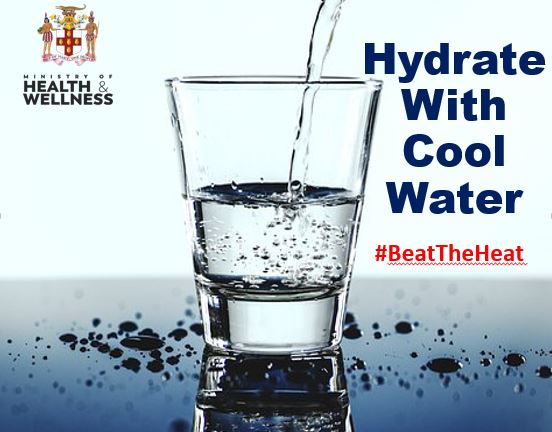Jamaicans Urged to Guard Against Heat Stress
By: , July 4, 2019The Key Point:
The Facts
- Heat stress occurs when the body becomes dehydrated and is unable to cool itself enough to maintain a healthy temperature. If left untreated, this can lead to heatstroke, which is a life-threatening medical emergency.
- Symptoms include tiredness and lethargy, headache, dizziness, feeling faint, nausea, vomiting, altered mental state, muscle cramps, feeling thirsty and urinating less often.
The Full Story
The Ministry of Health is advising Jamaicans to take precautions against heat stress as the country continues to experience high temperatures.
Heat stress occurs when the body becomes dehydrated and is unable to cool itself enough to maintain a healthy temperature. If left untreated, this can lead to heatstroke, which is a life-threatening medical emergency.
Symptoms include tiredness and lethargy, headache, dizziness, feeling faint, nausea, vomiting, altered mental state, muscle cramps, feeling thirsty and urinating less often.
Director of the Emergency Disaster Management and Social Services Branch in the Ministry of Health and Wellness, Dr. Nichole Dawkins Wright, said that the high temperatures combined with high humidity can cause heat-related illnesses.
“Some persons are more susceptible to these high temperatures. These persons include the elderly, persons who are overweight or obese, infants, children younger than six years of age and persons with chronic illnesses such as high blood pressure and diabetes,” she noted.
She is encouraging persons to limit sun exposure, particularly during the middle of the day; plan outdoor activities for the morning and evening hours, when the sun’s rays are less intense; and wear loose-fitting clothing and hats to protect the face.
Dr. Dawkins Wright said persons should stay hydrated by drinking more fluids, and limit or avoid sugar-sweetened beverages and alcohol.
“Drink water liberally, more water than you normally would, particularly during and after vigorous activities. When exercising, drink fluids regularly at least every 15 minutes. Wear light-coloured clothing, clothing that is made out of fabric that’s breathable, lightweight. Stay indoors. Avoid crowded areas [if possible] and ensure your homes and environments are well ventilated,” she said.
She said children and the elderly should not be left in hot cars, and a doctor should be consulted if there are signs of confusion, dizziness, nausea, muscle swelling, heart disturbances, or a headache.
Director of Nutrition Services in the Ministry, Dr. Charmaine Edwards, said that persons should ensure that they hydrate, even as they try to stay cool.
“Fans and air-conditioning (AC) units do keep you cool but in doing that they also dehydrate you. So you will, in fact, have to replace the fluids. Remember (when) you are perspiring, the water is being lost and the fan is just blowing it away and giving you the cooling effect. So you will still have to replace the fluid that is being lost,” she pointed out.
Dr. Edwards noted that although everyone is affected by the heat, specific groups, such as the elderly, tend to be more vulnerable.
“Just by being elderly they are already at risk, because there have been changes in how the body metabolises… so we want to pay attention to the elderly. Certainly, they need to be getting in at least six glasses of water per day,” she said.
She noted that younger children also need to be kept hydrated.
The Met Office has advised that the sweltering heat, which has seen temperatures soar to record levels, is associated with a hot spell between June and August.




